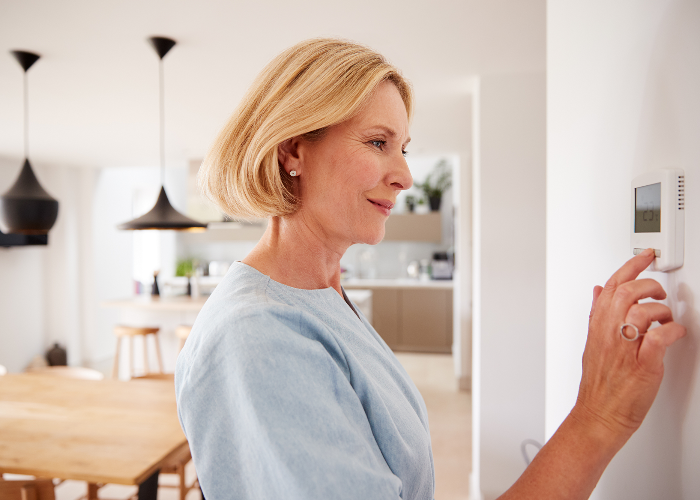Low-cost ways to save energy and cut your bills

As gas and electricity costs remain uncertain for the remainder of 2025, we reveal affordable ways to keep on top of your bills.
Sections
- Act now to beat sky-high bills
- 1. Switch energy deals – typical saving: up to £300 a year
- 2. Setting your boiler to Summer mode – typical saving: £240 a year
- 3. Four-minute showers – typical saving: £60 a year
- 4. Wash clothes at 30 degrees – typical saving: up to £30 a year
- 5. Turn your thermostat down – typical saving: £100 a year
- 6. Cover up draughts – typical saving: up to £95
- 7. Save energy when cooking – £60 a year
Act now to beat sky-high bills
Energy bills look set to fall by almost £130 a year for the typical household this Summer.
Analysts at Cornwall Insight predict that the Energy Price Cap – the maximum a provider can charge per unit of energy – will fall by 7% in July, taking the average annual bill to £1,720.
While this is certainly welcome news, it's worth noting that it comes after three consecutive hikes to the Energy Price Cap.
As a result, annual bills will still be more than £150 higher this Summer compared to last.
So it's important we all take steps to ensure we keep on top of costs.
The good news is you could potentially wipe £100s off your annual bills by following the eight simple tips below.
1. Switch energy deals – typical saving: up to £300 a year
While millions remain on their supplier’s standard variable tariff, these deals aren’t always the best value for money.
In fact, some fixed-rate deals offer significant savings in the current climate.
According to The Guardian, EDF recently launched a one-year tariff that could save the average household around £300 per year.
That said, you’ll need to be an existing customer to qualify. For anyone who isn't there are still a number of tariffs out there that'll save a typical user upwards of £200 a year.
If you haven’t reviewed your tariff in a while, it's a good time to compare your options.
We've teamed up with uSwitch to help you find a cheaper fixed energy deal, but any price comparison site will work for this.
2. Setting your boiler to Summer mode – typical saving: £240 a year
As temperatures rise, households could save approximately £20 a month (or £240 per year) by switching their boiler to ‘Summer mode’.
This is according to research from energy supplier GreenMatch reported in This Is Money.
Summer mode is standard on most modern boilers and allows you to turn off central heating, while still supplying hot water.
Unlike switching your boiler off completely, Summer mode keeps pumps and valves moving, preventing the system from seizing up – a repair that could cost up to £500.
If you’re unsure how to activate this feature, you should look for a sun or tap icon on your boiler.
|
PROMOTION
|
||
|
3. Four-minute showers – typical saving: £60 a year
Love long, hot showers? They may be relaxing, but costs can soon add up.
Although a shower is still more energy efficient than having a bath, high bills mean it’s a good idea to time yourself, rather than risk staying in there too long.
Setting an alarm for four minutes could save the average household up to £60 a year on their bills, the Energy Saving Trust has found.
4. Wash clothes at 30 degrees – typical saving: up to £30 a year
For most families, laundry is one of the biggest energy drains.
However, you could save a fortune by opting for fewer, colder washes.
If you switch to 30°C, the Energy Saving Trust suggests you could save up to £24 a year if you live in Great Britain.
This figure rises to £30 for those in Northern Ireland.
The body also recommends reducing your washing machine usage by one cycle per week.
5. Turn your thermostat down – typical saving: £100 a year
Closely monitoring your temperature can reduce energy use and lower heating bills, according to the Energy Saving Trust.
Most households could save approximately £100 simply by switching their thermostat down one degree and heating only rooms in use.
Installing heating controls could save households in Great Britain £90 a year and £100 in Northern Ireland.
Beat the recent energy price rises by locking into a cheaper deal now. Compare tariffs now with uSwitch.
6. Cover up draughts – typical saving: up to £95
Most properties have gaps and cracks that allow warm air to escape and cold air to enter.
Fixing these issues could save you between £80 and £95, the Energy Saving Trust has found.
Be aware, however, professional draught-proofing could cost approximately £250.
7. Save energy when cooking – £60 a year
Cooking accounts for about 3% of energy use in the home.
If you’re buying a new appliance, aim to purchase the most energy-efficient model you can afford.
If you’re getting a new cooker, induction hobs are up to 50% more efficient than traditional gas hobs but they also tend to be more expensive.
You should avoid using your oven to cook food as it’s often the most expensive way to do so, unless you are cooking a large batch of meals at the same time.
Air fryers have gained in popularity recently as they are energy-efficient and offer a healthy way to cook.
However, larger models can be expensive, often setting you back approximately £200.
There are other cheap ways to save energy in the kitchen.
Use a slow cooker or microwave
Meanwhile, slow cookers cost approximately £25 and can use as little as a tenth of the energy of a conventional oven. They are also a great way to cook soups, stews and other one-pot meals.
You can also use your microwave as an energy-efficient way of cooking.
If you have a double oven, use the smaller top oven to cook items, as it will be quicker to heat up. Try to cook more than one meal at once to make the most of the heat.
You can also turn electric ovens and hobs off five or more minutes before serving, as the residual heat will continue to cook the food, and use the right-sized pan for the hob.
Always use a lid when boiling food to cook it faster. Use a kettle instead of the stove to heat water, and only boil the amount you need.
It’s also helpful to fill your fridge to capacity and defrost it regularly to ensure it works efficiently.
If you’re struggling to pay your energy bills, contact your energy supplier and explain your situation or reach out to the Citizens Advice Bureau.
Comments
Be the first to comment
Do you want to comment on this article? You need to be signed in for this feature
